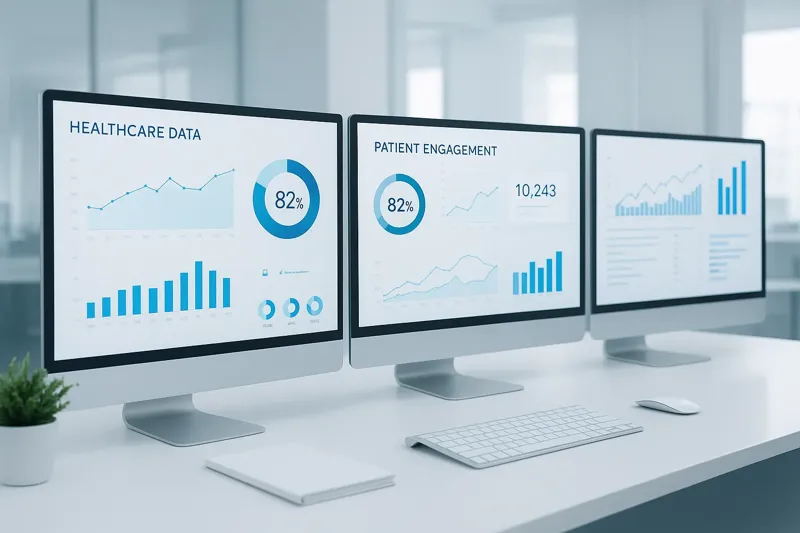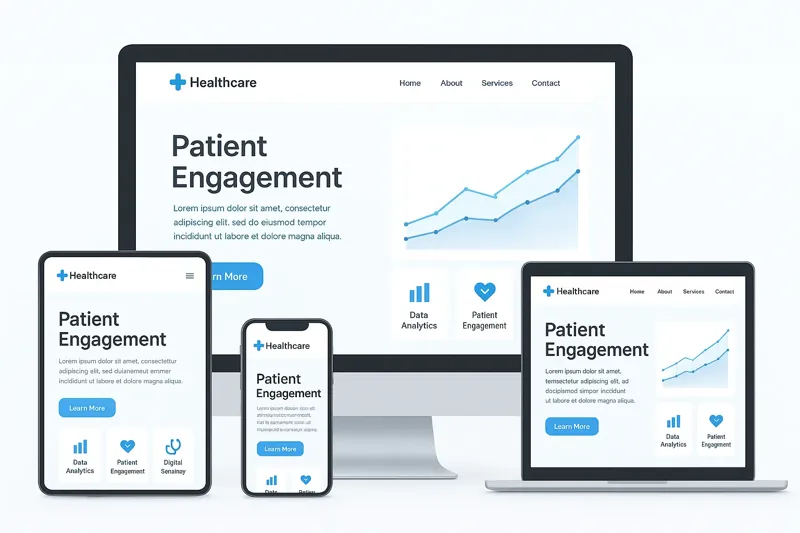Why Advanced SEO is a Game-Changer for Healthcare Providers in 2025
Importance of SEO for healthcare providers
In 2025, SEO has become indispensable for healthcare providers seeking to increase online visibility and attract high-value patients. With over 80% of healthcare-related searches performed on Google and 81% of clicks going to the top five organic results, ranking high in searches is crucial. SEO enhances brand credibility, patient trust, and website traffic, driving sustainable patient acquisition.
Increasing competition and digital patient acquisition
The healthcare sector faces heightened digital competition as providers vie for patients beginning their journey online. The integration of AI tools and a surge in local SEO efforts like optimizing Google Business Profiles and managing online reviews intensifies this race. Providers must prioritize mobile-first design and reputation management to capture and convert digitally savvy consumers effectively.
Overview of key SEO advancements and trends
Advanced SEO in healthcare now encompasses:
- Local SEO: Claiming and optimizing Google Business Profiles with consistent NAP data, and enhancing visibility through reviews and directory listings.
- Content Marketing: Creating authoritative, patient-focused blogs, FAQs, and videos tailored with long-tail, intent-driven keywords.
- Technical SEO: Ensuring mobile responsiveness, fast website loading, secure HTTPS protocols, and implementing schema markup to boost search engine comprehension.
- AI Integration: Utilizing AI-powered tools like ChatGPT for keyword research, content optimization, and patient engagement, while balancing automation with HIPAA compliance and human oversight.
Together, these advancements enable providers to dominate local search results, improve patient engagement, and achieve measurable growth in patient acquisition.
Harnessing the Power of Local SEO to Attract High-Value Patients

How can healthcare providers enhance their local SEO?
Healthcare providers can significantly boost their local SEO by focusing on several strategic actions. First, claiming and thoroughly optimizing their Google Business Profiles is essential. This involves maintaining accurate and up-to-date information, including practice hours, services offered, and high-quality images.
Consistent management of NAP (Name, Address, Phone) information across all online directories is crucial. Uniformity in these details across platforms like Healthgrades, Vitals, Facebook, and others helps build credibility and improve search engine trust.
Claiming and verifying listings on third-party review sites enhances visibility and allows providers to actively engage with patient feedback. Positive and regular patient reviews on these platforms, particularly Google My Business, have a profound impact on local search rankings and foster patient trust.
By integrating these tactics—optimized Google Business Profiles, consistent NAP data, verified third-party listings, and robust review management—healthcare practices can dominate local search results, increase website traffic, and attract higher-value patients in their communities.
Leveraging AI-Powered Tools for Smarter Keyword Research and Content Creation

What role do AI tools play in healthcare SEO keyword research?
AI tools such as ChatGPT, SEMrush, Ahrefs, and Ubersuggest have become indispensable in healthcare SEO. They enable marketers to discover targeted long-tail and intent-driven keywords by analyzing search behaviors, competitor strategies, and emerging trends. These tools improve efficiency in keyword research by quickly identifying high-value search terms that align with patient intent, which traditional methods may overlook.
Use of AI in keyword research and content optimization
Leveraging AI in keyword research allows for actionable insights into patient queries, enabling the development of content that precisely addresses user needs. AI-driven content optimization aids in maintaining content relevance by suggesting semantic keywords and related terms, thus preventing keyword stuffing while enhancing topical depth and authority.
Targeting long-tail and intent-driven keywords
Long-tail keywords, often highly specific and locally focused (e.g., “best pediatric allergy specialist in Chicago”), are critical for capturing qualified patient traffic. AI tools can identify these nuanced queries to tailor content that matches patient search intent, which increases the chances of higher conversions and better engagement.
Tools like ChatGPT, SEMrush, Ahrefs, Ubersuggest
These platforms collectively support healthcare marketers by offering comprehensive keyword databases, competitor analysis, search volume data, and content gap identification. ChatGPT specifically enhances content creation by generating natural language text that addresses patient questions in an authoritative and trust-building manner.
Avoiding keyword stuffing and enhancing topical relevance
AI tools promote creating content that naturally integrates keywords within a rich context, adhering to SEO best practices and Google’s E-E-A-T (Experience, Expertise, Authority, Trustworthiness) guidelines. This strategic approach improves search engine rankings while delivering valuable, patient-centric information.
By integrating AI-powered keyword research and content creation tools, healthcare providers can optimize their SEO strategies, drive targeted organic traffic, and foster meaningful patient engagement.
Crafting High-Quality, Patient-Centric Content to Boost Authority and Engagement

How does content quality affect healthcare SEO?
High-quality content is fundamental for healthcare SEO because it directly builds trust and authority with both search engines and patients. Google’s E-E-A-T framework (Experience, Expertise, Authoritativeness, Trustworthiness) emphasizes the importance of medically accurate, well-researched information, especially for Your Money or Your Life (YMYL) healthcare topics.
Creating medically accurate blogs, FAQs, and videos
Developing patient-focused blogs, FAQs, and educational videos that accurately cover medical conditions, treatments, and preventive care not only provides value to patients but also increases engagement metrics such as time spent on the site. These resources should be comprehensive and answer common patient questions in clear, accessible language. For strategies on using video content for SEO and patient education, see effective approaches that boost visibility and patient engagement.
Role of licensed professionals in content creation
Having licensed healthcare professionals author or rigorously review all content ensures accuracy and builds credibility. Their expertise aligns the content with current medical standards and compliance requirements, which is crucial for maintaining trustworthiness and meeting search engine quality standards. This approach supports healthcare SEO compliance and medical accuracy.
Incorporating local keywords and schema markup
Inserting location-specific keywords throughout the content helps capture local search intent, drawing geographically relevant patients. Additionally, implementing schema markup for healthcare SEO for articles and FAQs enables search engines to better understand and feature the content in rich search results, enhancing visibility and click-through rates.
By focusing on detailed, accurate, and educational content created or vetted by medical professionals, healthcare practices can strengthen their online authority, improve SEO rankings, and engage patients more effectively through AI SEO for doctors and comprehensive healthcare content marketing strategies.
Optimizing Technical SEO for Performance, Security, and User Experience
What technical SEO factors are essential for medical websites in 2025?
In 2025, medical websites must prioritize several critical technical SEO factors to ensure strong search engine rankings and an excellent user experience. First, site speed is paramount. Optimizing Core Web Vitals metrics (LCP, FID, CLS, INP) — including Largest Contentful Paint (LCP), First Input Delay (FID), Cumulative Layout Shift (CLS), and the newer Interaction to Next Paint (INP) metric — is vital for fast loading times and smooth interactivity, which both boost patient trust and SEO rankings.
Mobile-first design is another essential factor. Given that over 60% of healthcare searches occur on mobile devices, responsive websites that adjust seamlessly to different screen sizes and maintain readability are crucial for visitor engagement and retention.
Security plays a fundamental role as well; HTTPS implementation ensures encrypted data transfer, safeguarding patient information and enhancing the website's credibility in Google's eyes.
Routine HTML audits help identify technical issues such as broken links, coding errors, or duplicate content that can hinder crawlability. Proper internal linking strengthens site structure and allows search engines to index pages efficiently, improving overall visibility.
Together, these technical SEO best practices support medical websites in delivering fast, secure, and accessible digital experiences, directly contributing to higher search rankings, increased patient visits, and sustained practice growth.
Building a Strong Backlink Profile with Reputable Healthcare Sources
How important are backlinks in healthcare SEO, and how should they be acquired?
Backlinks play a critical role in healthcare SEO by acting as endorsements from reputable sources that bolster a website’s domain authority and improve its rankings on search engines like Google. For healthcare providers, quality backlinks typically come from medical directories, respected healthcare journals, industry associations, and authoritative medical portals. For more on ethical backlink building for healthcare, see this guide.
Importance of backlinks for domain authority
High-quality backlinks signal to search engines that a healthcare site is trustworthy and credible. This trust translates into better visibility in search results, increased organic traffic, and ultimately, more patient inquiries. Unlike sheer quantity, the focus needs to be on the relevance and reliability of the linking sources, as links from authoritative medical websites carry greater weight. Learn about building backlinks from medical directories and their importance.
Acquiring links ethically from directories and medical portals
Obtaining backlinks should be an ethical process, involving strategies such as:
- Submitting accurate and well-maintained listings to reputable healthcare directories (e.g., Healthgrades, WebMD). See claiming Healthgrades and Vitals profiles.
- Collaborating with local medical organizations and associations to gain mentions and partnerships. This reinforces community engagement for SEO.
- Contributing guest posts or expert commentary to trusted medical blogs and online publications. This supports content marketing strategy for doctors.
These methods not only enhance SEO but also build genuine relationships within the healthcare community.
Avoiding black-hat tactics and penalties
It is crucial to avoid black-hat SEO tactics like buying links, link farms, or irrelevant link exchanges, as these can lead to severe penalties from search engines and harm a practice’s online reputation. Nearly half of healthcare marketers who engaged in such tactics faced negative consequences. Maintaining ethical standards ensures sustainable, long-term SEO benefits. Explore black hat SEO risks in healthcare for detailed risks.
Community partnerships and media mentions
Engagement with local community groups, health campaigns, and media outlets offers excellent opportunities to earn backlinks naturally. Coverage in news stories, awards, and sponsorships often results in backlinks from credible sources, boosting both reputation and search rankings. See strategies for growing medical practice with SEO and community engagement for SEO.
By focusing on high-quality, ethical backlink building, healthcare providers can significantly strengthen their SEO performance and attract more patients in the competitive digital landscape of 2025. For a comprehensive approach, consider advanced SEO strategies for medical practices.
Mastering Online Reputation with Patient Reviews and Social Proof
What strategies help healthcare providers manage online reputation effectively?
Effective management of online reputation for healthcare providers hinges on actively soliciting patient reviews and leveraging social proof. Providers should encourage patients to leave reviews predominantly on Google My Business and influential third-party review platforms such as Healthgrades, Vitals, and Facebook. Collecting these reviews via HIPAA-compliant, automated methods — such as secure SMS or email requests — ensures patient privacy and compliance with healthcare regulations.
Displaying these authentic, recent reviews prominently on both practice websites and Google Business Profiles strengthens patient trust and enhances local SEO rankings. A higher volume of credible patient feedback correlates with increased visibility in local search results and significantly raises patient inquiries. Integrating social proof, including testimonials and star ratings, offers a persuasive transparency that reassures prospective patients, improving their conversion likelihood.
By combining consistent review management, adherence to compliance requirements, and strategic public display of social proof, healthcare practices can build a strong online reputation that contributes to measurable patient growth and sustained competitive advantage in 2025.
Utilizing Video Content to Enhance SEO and Patient Engagement
How can video content contribute to healthcare SEO and engagement?
Video content plays a vital role in healthcare SEO and patient engagement by offering dynamic and accessible ways to communicate information. Educational videos, FAQs, and provider introductions serve multiple purposes: they inform patients, address common health concerns, and personalize the healthcare experience (Video Content for SEO, Video Marketing in Healthcare, Video Marketing for Healthcare).
By increasing the time visitors spend on a healthcare website, videos enhance important SEO metrics, signaling to search engines that the content is valuable and engaging (importance of online reviews in healthcare SEO, Healthcare SEO trends 2025, Healthcare SEO strategies). This improved engagement helps medical practices rank higher in search results, attracting more potential patients (Increasing Patient Inquiries Through SEO, Boosting Local Search Rankings for Doctors).
Optimizing videos with targeted keywords in titles, descriptions, and tags ensures that search engines can easily index and display the content in search results (Keyword Research Tools for Doctors, Local SEO for Healthcare Practices. Incorporating schema markup can further improve visibility by enabling enhanced snippets (Schema Markup in Medical SEO, Technical SEO for Healthcare Websites.
Integration of video content across social media platforms such as Facebook, YouTube, and Instagram, as well as embedding videos on the practice website, broadens reach and increases patient trust (Managing Practice Facebook Pages, Healthcare Social Media Engagement, Healthcare Marketing Strategies). Sharing authentic provider introductions and patient education videos fosters stronger connections, reinforcing credibility and encouraging appointment bookings (Healthcare Testimonials Marketing, Patient Testimonial Videos.
Employing a consistent video marketing strategy with regular updates and diverse formats helps healthcare providers maintain a competitive SEO advantage while enriching the patient experience (Healthcare Digital Marketing Trends 2025, Video Content for SEO.
Adapting to AI-Driven Search and the Rise of Zero-Click SEO
How is AI changing healthcare SEO and search strategies?
Artificial intelligence (AI) is transforming the healthcare search landscape by introducing AI chatbots and large language models (LLMs) like ChatGPT and Gemini. These technologies generate immediate, conversational responses to search queries, leading to a surge in zero-click searches where users find answers without visiting traditional websites. For healthcare providers, this means less organic traffic from traditional search results unless strategies evolve. Learn more about the new consumer health search landscape shaping healthcare.
What is Generative Engine Optimization (GEO) and why is it important?
Generative Engine Optimization (GEO) is a new SEO approach tailored to AI-driven search environments. GEO focuses on creating content that AI systems prefer to use for generated answers. This includes structuring content with clear, concise information, utilizing schema markup in healthcare SEO, and providing authoritative answers to common patient questions. GEO ensures healthcare providers maintain top-of-mind visibility in AI summaries and search results. See insights on optimizing for AI search with GEO.
How does creating structured content help in zero-click searches?
Structured content formatted as FAQs, well-defined headings, and rich metadata enables search engines and AI chatbots to easily extract relevant information. Using schema markup like FAQPage and MedicalEntity helps display essential details directly in search snippets. This strategy not only improves search visibility but also enhances user engagement by providing quick, trustworthy answers, crucial in healthcare decision-making. Explore technical SEO and schema markup for healthcare.
Why is a cross-channel optimization strategy critical?
Given that healthcare consumers use multiple platforms—including social media, forums, video channels, and AI assistants—a cross-channel optimization approach widens reach and ensures consistent messaging. Integrating traditional SEO with social media and video marketing, along with optimizing for AI search tools, creates a cohesive patient acquisition funnel. This multi-channel presence builds credibility, reinforces brand awareness, and adapts to evolving consumer behaviors driven by AI technologies. Read more about omnichannel marketing strategies in healthcare and using video content for SEO.
Leveraging AI-aware SEO techniques like GEO, structured content, and cross-channel tactics equips healthcare marketers to thrive in the changing digital environment while enhancing patient trust and engagement. For comprehensive strategies, see SEO for doctors 2025 and healthcare marketing trends and healthcare marketing trends shaping 2025 and beyond.
Ensuring Compliance and Privacy in Healthcare SEO Practices
What privacy considerations are essential when implementing SEO for healthcare providers?
Compliance with HIPAA and other data privacy regulations remains paramount in healthcare SEO to protect sensitive patient information and uphold trust.
Healthcare providers must avoid using unencrypted forms on websites to prevent exposing patient data during submission processes. Likewise, unauthorized tracking by third-party tools can jeopardize compliance and patient privacy, so all tracking mechanisms must be carefully vetted.
Privacy-first analytics tools designed for healthcare marketing are increasingly used to ensure compliance. These tools employ data masking and anonymization techniques to collect actionable insights while safeguarding personal health information.
Transparent practices that inform patients about data use and obtain necessary consents help reinforce trust and align with evolving privacy laws. Adhering to these standards not only meets legal requirements but also improves a provider’s reputation in a privacy-conscious consumer landscape.
In summary, healthcare SEO must integrate stringent privacy protocols including HIPAA compliance, avoidance of unsecured data collection methods, responsible use of analytics, and transparent patient communication to build and sustain patient confidence. For more insights, see Healthcare SEO compliance and medical accuracy and Privacy-first healthcare marketing.
Integrating Advanced Technical Innovations for SEO Success
What advanced technical SEO techniques should healthcare providers adopt?
Healthcare providers aiming for SEO success in 2025 must embrace a set of sophisticated technical innovations.
Schema markup, particularly schemas like LocalBusiness and MedicalClinic, enables search engines to better interpret and display critical practice information. This enhances search result visibility through rich snippets showing reviews, operating hours, and services directly in Google results.
Progressive Web Apps (PWAs) are transforming website performance by combining fast loading times with offline accessibility. PWAs ensure seamless patient website experiences, even with intermittent connectivity, which is essential as most healthcare searches occur on mobile devices.
Visual and voice search optimization targets emerging search behaviors. By structuring content around natural language queries and integrating image SEO best practices, healthcare sites capture traffic through AI-powered assistants and visual search platforms.
Leveraging AI-driven predictive SEO and automation tools automates key SEO workflows such as internal linking, content optimization, and ranking trend forecasting. These tools enable healthcare providers to adapt rapidly to algorithm changes, optimize patient-facing content, and maintain competitive advantage with less manual effort.
Adopting this spectrum of advanced technical SEO strategies not only boosts ranking performance but also strengthens user engagement, accessibility, and patient acquisition outcomes in the competitive healthcare market.
Leveraging Omnichannel Marketing to Complement SEO Efforts
How does omnichannel marketing enhance healthcare SEO strategies?
Omnichannel marketing strengthens healthcare SEO by integrating multiple communication channels—including email, social media, direct mail, and secure messaging—into a cohesive patient engagement approach. This coordination ensures personalized, consistent messaging that complements SEO efforts by reinforcing trust and increasing the frequency of patient interactions. Learn more about Omnichannel marketing strategies in healthcare and Healthcare marketing channel integration.
Integrating email, social media, direct mail
Healthcare providers can amplify their SEO impact by syncing online search strategies with targeted email campaigns, active social media presence, and direct mail outreach. These channels deliver customized content that nurtures patient relationships and drives traffic to optimized websites, supporting ongoing visibility in search results. See strategies for Healthcare SEO trends 2025 and Social Media Campaigns in Healthcare.
Creating seamless patient experiences
A seamless omnichannel approach allows patients to receive relevant information and service reminders across their preferred platforms. This personalized experience not only improves satisfaction but also encourages repeat visits and referrals, which positively influence online reputation and search rankings. Explore Personalized healthcare experiences and Integrated service reminders for healthcare.
Using secure messaging and AI analytics
Incorporating secure, HIPAA-compliant messaging platforms into omnichannel campaigns enhances patient communication while safeguarding privacy. AI analytics and automated follow-ups analyze patient interactions to refine messaging and engagement tactics, ensuring efficient and targeted outreach that works in synergy with SEO. Learn about Healthcare digital marketing strategy 2025 and AI adoption in healthcare marketing.
Supporting patient retention and trust
By providing integrated and personalized communication touchpoints, omnichannel marketing builds patient loyalty and trust. This ongoing engagement complements SEO by generating patient reviews, social proof, and increased website visits—key factors that contribute to sustained growth and high rankings. Discover more on Review management for healthcare, Online reputation management, and Building trust in digital health.
Future-Proofing Your Healthcare Practice with Advanced SEO in 2025
Continuous Adaptation to SEO Algorithm Changes
Healthcare SEO professionals must remain vigilant to frequent search engine algorithm updates. Monitoring shifts through reliable SEO tools such as Moz and Ahrefs, along with ongoing education, allows healthcare providers to promptly adjust strategies. Emphasis on mobile optimization, website speed enhancement, and technical audits ensures compliance with evolving ranking factors.
Embracing AI and Data Privacy Coexistence
AI implementation, particularly with tools like ChatGPT, enriches keyword research, content creation, and patient engagement. However, balancing automation with strict HIPAA compliance and privacy best practices is critical. Providers should implement human oversight alongside AI-driven insights to maintain accuracy and protect patient data.
Focusing on Patient-Centered, Trustworthy Content
Content must uphold Google's E-E-A-T principles—Experience, Expertise, Authoritativeness, and Trustworthiness—to rank well and build patient trust. Creating medically accurate, licensed professional–reviewed blogs, FAQs, and educational videos addresses patient needs while enhancing visibility. Incorporating local search intent through location-specific keywords strengthens relevance.
Sustaining Growth Through Integrated, Ethical Strategies
Long-term practice growth requires an ethical and integrated approach, including consistent NAP data across directories, proactive review management, and quality backlink development from reputable medical sources. Combining local SEO with video content, social media engagement, and omnichannel marketing creates a cohesive digital footprint that fosters patient acquisition and retention.
Healthcare providers leveraging these advanced strategies not only enhance search rankings but also reinforce credibility, patient trust, and measurable practice expansion in 2025 and beyond.
Why Advanced SEO is a Game-Changer for Healthcare Providers in 2025
Importance of SEO for healthcare providers
In 2025, SEO has become indispensable for healthcare providers seeking to increase online visibility and attract high-value patients. With over 80% of healthcare-related searches performed on Google and 81% of clicks going to the top five organic results, ranking high in searches is crucial. SEO enhances brand credibility, patient trust, and website traffic, driving sustainable patient acquisition.
Increasing competition and digital patient acquisition
The healthcare sector faces heightened digital competition as providers vie for patients beginning their journey online. The integration of AI tools and a surge in local SEO efforts like optimizing Google Business Profiles and managing online reviews intensifies this race. Providers must prioritize mobile-first design and reputation management to capture and convert digitally savvy consumers effectively.
Overview of key SEO advancements and trends
Advanced SEO in healthcare now encompasses:
- Local SEO: Claiming and optimizing Google Business Profiles with consistent NAP data, and enhancing visibility through reviews and directory listings.
- Content Marketing: Creating authoritative, patient-focused blogs, FAQs, and videos tailored with long-tail, intent-driven keywords.
- Technical SEO: Ensuring mobile responsiveness, fast website loading, secure HTTPS protocols, and implementing schema markup to boost search engine comprehension.
- AI Integration: Utilizing AI-powered tools like ChatGPT for keyword research, content optimization, and patient engagement, while balancing automation with HIPAA compliance and human oversight.
Together, these advancements enable providers to dominate local search results, improve patient engagement, and achieve measurable growth in patient acquisition.
Harnessing the Power of Local SEO to Attract High-Value Patients

How can healthcare providers enhance their local SEO?
Healthcare providers can significantly boost their local SEO by focusing on several strategic actions. First, claiming and thoroughly optimizing their Google Business Profiles is essential. This involves maintaining accurate and up-to-date information, including practice hours, services offered, and high-quality images.
Consistent management of NAP (Name, Address, Phone) information across all online directories is crucial. Uniformity in these details across platforms like Healthgrades, Vitals, Facebook, and others helps build credibility and improve search engine trust.
Claiming and verifying listings on third-party review sites enhances visibility and allows providers to actively engage with patient feedback. Positive and regular patient reviews on these platforms, particularly Google My Business, have a profound impact on local search rankings and foster patient trust.
By integrating these tactics—optimized Google Business Profiles, consistent NAP data, verified third-party listings, and robust review management—healthcare practices can dominate local search results, increase website traffic, and attract higher-value patients in their communities.
Leveraging AI-Powered Tools for Smarter Keyword Research and Content Creation

What role do AI tools play in healthcare SEO keyword research?
AI tools such as ChatGPT, SEMrush, Ahrefs, and Ubersuggest have become indispensable in healthcare SEO. They enable marketers to discover targeted long-tail and intent-driven keywords by analyzing search behaviors, competitor strategies, and emerging trends. These tools improve efficiency in keyword research by quickly identifying high-value search terms that align with patient intent, which traditional methods may overlook.
Use of AI in keyword research and content optimization
Leveraging AI in keyword research allows for actionable insights into patient queries, enabling the development of content that precisely addresses user needs. AI-driven content optimization aids in maintaining content relevance by suggesting semantic keywords and related terms, thus preventing keyword stuffing while enhancing topical depth and authority.
Targeting long-tail and intent-driven keywords
Long-tail keywords, often highly specific and locally focused (e.g., “best pediatric allergy specialist in Chicago”), are critical for capturing qualified patient traffic. AI tools can identify these nuanced queries to tailor content that matches patient search intent, which increases the chances of higher conversions and better engagement.
Tools like ChatGPT, SEMrush, Ahrefs, Ubersuggest
These platforms collectively support healthcare marketers by offering comprehensive keyword databases, competitor analysis, search volume data, and content gap identification. ChatGPT specifically enhances content creation by generating natural language text that addresses patient questions in an authoritative and trust-building manner.
Avoiding keyword stuffing and enhancing topical relevance
AI tools promote creating content that naturally integrates keywords within a rich context, adhering to SEO best practices and Google’s E-E-A-T (Experience, Expertise, Authority, Trustworthiness) guidelines. This strategic approach improves search engine rankings while delivering valuable, patient-centric information.
By integrating AI-powered keyword research and content creation tools, healthcare providers can optimize their SEO strategies, drive targeted organic traffic, and foster meaningful patient engagement.
Crafting High-Quality, Patient-Centric Content to Boost Authority and Engagement

How does content quality affect healthcare SEO?
High-quality content is fundamental for healthcare SEO because it directly builds trust and authority with both search engines and patients. Google’s E-E-A-T framework (Experience, Expertise, Authoritativeness, Trustworthiness) emphasizes the importance of medically accurate, well-researched information, especially for Your Money or Your Life (YMYL) healthcare topics.
Creating medically accurate blogs, FAQs, and videos
Developing patient-focused blogs, FAQs, and educational videos that accurately cover medical conditions, treatments, and preventive care not only provides value to patients but also increases engagement metrics such as time spent on the site. These resources should be comprehensive and answer common patient questions in clear, accessible language. For strategies on using video content for SEO and patient education, see effective approaches that boost visibility and patient engagement.
Role of licensed professionals in content creation
Having licensed healthcare professionals author or rigorously review all content ensures accuracy and builds credibility. Their expertise aligns the content with current medical standards and compliance requirements, which is crucial for maintaining trustworthiness and meeting search engine quality standards. This approach supports healthcare SEO compliance and medical accuracy.
Incorporating local keywords and schema markup
Inserting location-specific keywords throughout the content helps capture local search intent, drawing geographically relevant patients. Additionally, implementing schema markup for healthcare SEO for articles and FAQs enables search engines to better understand and feature the content in rich search results, enhancing visibility and click-through rates.
By focusing on detailed, accurate, and educational content created or vetted by medical professionals, healthcare practices can strengthen their online authority, improve SEO rankings, and engage patients more effectively through AI SEO for doctors and comprehensive healthcare content marketing strategies.
Optimizing Technical SEO for Performance, Security, and User Experience
What technical SEO factors are essential for medical websites in 2025?
In 2025, medical websites must prioritize several critical technical SEO factors to ensure strong search engine rankings and an excellent user experience. First, site speed is paramount. Optimizing Core Web Vitals metrics (LCP, FID, CLS, INP) — including Largest Contentful Paint (LCP), First Input Delay (FID), Cumulative Layout Shift (CLS), and the newer Interaction to Next Paint (INP) metric — is vital for fast loading times and smooth interactivity, which both boost patient trust and SEO rankings.
Mobile-first design is another essential factor. Given that over 60% of healthcare searches occur on mobile devices, responsive websites that adjust seamlessly to different screen sizes and maintain readability are crucial for visitor engagement and retention.
Security plays a fundamental role as well; HTTPS implementation ensures encrypted data transfer, safeguarding patient information and enhancing the website's credibility in Google's eyes.
Routine HTML audits help identify technical issues such as broken links, coding errors, or duplicate content that can hinder crawlability. Proper internal linking strengthens site structure and allows search engines to index pages efficiently, improving overall visibility.
Together, these technical SEO best practices support medical websites in delivering fast, secure, and accessible digital experiences, directly contributing to higher search rankings, increased patient visits, and sustained practice growth.
Building a Strong Backlink Profile with Reputable Healthcare Sources
How important are backlinks in healthcare SEO, and how should they be acquired?
Backlinks play a critical role in healthcare SEO by acting as endorsements from reputable sources that bolster a website’s domain authority and improve its rankings on search engines like Google. For healthcare providers, quality backlinks typically come from medical directories, respected healthcare journals, industry associations, and authoritative medical portals. For more on ethical backlink building for healthcare, see this guide.
Importance of backlinks for domain authority
High-quality backlinks signal to search engines that a healthcare site is trustworthy and credible. This trust translates into better visibility in search results, increased organic traffic, and ultimately, more patient inquiries. Unlike sheer quantity, the focus needs to be on the relevance and reliability of the linking sources, as links from authoritative medical websites carry greater weight. Learn about building backlinks from medical directories and their importance.
Acquiring links ethically from directories and medical portals
Obtaining backlinks should be an ethical process, involving strategies such as:
- Submitting accurate and well-maintained listings to reputable healthcare directories (e.g., Healthgrades, WebMD). See claiming Healthgrades and Vitals profiles.
- Collaborating with local medical organizations and associations to gain mentions and partnerships. This reinforces community engagement for SEO.
- Contributing guest posts or expert commentary to trusted medical blogs and online publications. This supports content marketing strategy for doctors.
These methods not only enhance SEO but also build genuine relationships within the healthcare community.
Avoiding black-hat tactics and penalties
It is crucial to avoid black-hat SEO tactics like buying links, link farms, or irrelevant link exchanges, as these can lead to severe penalties from search engines and harm a practice’s online reputation. Nearly half of healthcare marketers who engaged in such tactics faced negative consequences. Maintaining ethical standards ensures sustainable, long-term SEO benefits. Explore black hat SEO risks in healthcare for detailed risks.
Community partnerships and media mentions
Engagement with local community groups, health campaigns, and media outlets offers excellent opportunities to earn backlinks naturally. Coverage in news stories, awards, and sponsorships often results in backlinks from credible sources, boosting both reputation and search rankings. See strategies for growing medical practice with SEO and community engagement for SEO.
By focusing on high-quality, ethical backlink building, healthcare providers can significantly strengthen their SEO performance and attract more patients in the competitive digital landscape of 2025. For a comprehensive approach, consider advanced SEO strategies for medical practices.
Mastering Online Reputation with Patient Reviews and Social Proof
What strategies help healthcare providers manage online reputation effectively?
Effective management of online reputation for healthcare providers hinges on actively soliciting patient reviews and leveraging social proof. Providers should encourage patients to leave reviews predominantly on Google My Business and influential third-party review platforms such as Healthgrades, Vitals, and Facebook. Collecting these reviews via HIPAA-compliant, automated methods — such as secure SMS or email requests — ensures patient privacy and compliance with healthcare regulations.
Displaying these authentic, recent reviews prominently on both practice websites and Google Business Profiles strengthens patient trust and enhances local SEO rankings. A higher volume of credible patient feedback correlates with increased visibility in local search results and significantly raises patient inquiries. Integrating social proof, including testimonials and star ratings, offers a persuasive transparency that reassures prospective patients, improving their conversion likelihood.
By combining consistent review management, adherence to compliance requirements, and strategic public display of social proof, healthcare practices can build a strong online reputation that contributes to measurable patient growth and sustained competitive advantage in 2025.
Utilizing Video Content to Enhance SEO and Patient Engagement
How can video content contribute to healthcare SEO and engagement?
Video content plays a vital role in healthcare SEO and patient engagement by offering dynamic and accessible ways to communicate information. Educational videos, FAQs, and provider introductions serve multiple purposes: they inform patients, address common health concerns, and personalize the healthcare experience (Video Content for SEO, Video Marketing in Healthcare, Video Marketing for Healthcare).
By increasing the time visitors spend on a healthcare website, videos enhance important SEO metrics, signaling to search engines that the content is valuable and engaging (importance of online reviews in healthcare SEO, Healthcare SEO trends 2025, Healthcare SEO strategies). This improved engagement helps medical practices rank higher in search results, attracting more potential patients (Increasing Patient Inquiries Through SEO, Boosting Local Search Rankings for Doctors).
Optimizing videos with targeted keywords in titles, descriptions, and tags ensures that search engines can easily index and display the content in search results (Keyword Research Tools for Doctors, Local SEO for Healthcare Practices. Incorporating schema markup can further improve visibility by enabling enhanced snippets (Schema Markup in Medical SEO, Technical SEO for Healthcare Websites.
Integration of video content across social media platforms such as Facebook, YouTube, and Instagram, as well as embedding videos on the practice website, broadens reach and increases patient trust (Managing Practice Facebook Pages, Healthcare Social Media Engagement, Healthcare Marketing Strategies). Sharing authentic provider introductions and patient education videos fosters stronger connections, reinforcing credibility and encouraging appointment bookings (Healthcare Testimonials Marketing, Patient Testimonial Videos.
Employing a consistent video marketing strategy with regular updates and diverse formats helps healthcare providers maintain a competitive SEO advantage while enriching the patient experience (Healthcare Digital Marketing Trends 2025, Video Content for SEO.
Adapting to AI-Driven Search and the Rise of Zero-Click SEO
How is AI changing healthcare SEO and search strategies?
Artificial intelligence (AI) is transforming the healthcare search landscape by introducing AI chatbots and large language models (LLMs) like ChatGPT and Gemini. These technologies generate immediate, conversational responses to search queries, leading to a surge in zero-click searches where users find answers without visiting traditional websites. For healthcare providers, this means less organic traffic from traditional search results unless strategies evolve. Learn more about the new consumer health search landscape shaping healthcare.
What is Generative Engine Optimization (GEO) and why is it important?
Generative Engine Optimization (GEO) is a new SEO approach tailored to AI-driven search environments. GEO focuses on creating content that AI systems prefer to use for generated answers. This includes structuring content with clear, concise information, utilizing schema markup in healthcare SEO, and providing authoritative answers to common patient questions. GEO ensures healthcare providers maintain top-of-mind visibility in AI summaries and search results. See insights on optimizing for AI search with GEO.
How does creating structured content help in zero-click searches?
Structured content formatted as FAQs, well-defined headings, and rich metadata enables search engines and AI chatbots to easily extract relevant information. Using schema markup like FAQPage and MedicalEntity helps display essential details directly in search snippets. This strategy not only improves search visibility but also enhances user engagement by providing quick, trustworthy answers, crucial in healthcare decision-making. Explore technical SEO and schema markup for healthcare.
Why is a cross-channel optimization strategy critical?
Given that healthcare consumers use multiple platforms—including social media, forums, video channels, and AI assistants—a cross-channel optimization approach widens reach and ensures consistent messaging. Integrating traditional SEO with social media and video marketing, along with optimizing for AI search tools, creates a cohesive patient acquisition funnel. This multi-channel presence builds credibility, reinforces brand awareness, and adapts to evolving consumer behaviors driven by AI technologies. Read more about omnichannel marketing strategies in healthcare and using video content for SEO.
Leveraging AI-aware SEO techniques like GEO, structured content, and cross-channel tactics equips healthcare marketers to thrive in the changing digital environment while enhancing patient trust and engagement. For comprehensive strategies, see SEO for doctors 2025 and healthcare marketing trends and healthcare marketing trends shaping 2025 and beyond.
Ensuring Compliance and Privacy in Healthcare SEO Practices
What privacy considerations are essential when implementing SEO for healthcare providers?
Compliance with HIPAA and other data privacy regulations remains paramount in healthcare SEO to protect sensitive patient information and uphold trust.
Healthcare providers must avoid using unencrypted forms on websites to prevent exposing patient data during submission processes. Likewise, unauthorized tracking by third-party tools can jeopardize compliance and patient privacy, so all tracking mechanisms must be carefully vetted.
Privacy-first analytics tools designed for healthcare marketing are increasingly used to ensure compliance. These tools employ data masking and anonymization techniques to collect actionable insights while safeguarding personal health information.
Transparent practices that inform patients about data use and obtain necessary consents help reinforce trust and align with evolving privacy laws. Adhering to these standards not only meets legal requirements but also improves a provider’s reputation in a privacy-conscious consumer landscape.
In summary, healthcare SEO must integrate stringent privacy protocols including HIPAA compliance, avoidance of unsecured data collection methods, responsible use of analytics, and transparent patient communication to build and sustain patient confidence. For more insights, see Healthcare SEO compliance and medical accuracy and Privacy-first healthcare marketing.
Integrating Advanced Technical Innovations for SEO Success
What advanced technical SEO techniques should healthcare providers adopt?
Healthcare providers aiming for SEO success in 2025 must embrace a set of sophisticated technical innovations.
Schema markup, particularly schemas like LocalBusiness and MedicalClinic, enables search engines to better interpret and display critical practice information. This enhances search result visibility through rich snippets showing reviews, operating hours, and services directly in Google results.
Progressive Web Apps (PWAs) are transforming website performance by combining fast loading times with offline accessibility. PWAs ensure seamless patient website experiences, even with intermittent connectivity, which is essential as most healthcare searches occur on mobile devices.
Visual and voice search optimization targets emerging search behaviors. By structuring content around natural language queries and integrating image SEO best practices, healthcare sites capture traffic through AI-powered assistants and visual search platforms.
Leveraging AI-driven predictive SEO and automation tools automates key SEO workflows such as internal linking, content optimization, and ranking trend forecasting. These tools enable healthcare providers to adapt rapidly to algorithm changes, optimize patient-facing content, and maintain competitive advantage with less manual effort.
Adopting this spectrum of advanced technical SEO strategies not only boosts ranking performance but also strengthens user engagement, accessibility, and patient acquisition outcomes in the competitive healthcare market.
Leveraging Omnichannel Marketing to Complement SEO Efforts
How does omnichannel marketing enhance healthcare SEO strategies?
Omnichannel marketing strengthens healthcare SEO by integrating multiple communication channels—including email, social media, direct mail, and secure messaging—into a cohesive patient engagement approach. This coordination ensures personalized, consistent messaging that complements SEO efforts by reinforcing trust and increasing the frequency of patient interactions. Learn more about Omnichannel marketing strategies in healthcare and Healthcare marketing channel integration.
Integrating email, social media, direct mail
Healthcare providers can amplify their SEO impact by syncing online search strategies with targeted email campaigns, active social media presence, and direct mail outreach. These channels deliver customized content that nurtures patient relationships and drives traffic to optimized websites, supporting ongoing visibility in search results. See strategies for Healthcare SEO trends 2025 and Social Media Campaigns in Healthcare.
Creating seamless patient experiences
A seamless omnichannel approach allows patients to receive relevant information and service reminders across their preferred platforms. This personalized experience not only improves satisfaction but also encourages repeat visits and referrals, which positively influence online reputation and search rankings. Explore Personalized healthcare experiences and Integrated service reminders for healthcare.
Using secure messaging and AI analytics
Incorporating secure, HIPAA-compliant messaging platforms into omnichannel campaigns enhances patient communication while safeguarding privacy. AI analytics and automated follow-ups analyze patient interactions to refine messaging and engagement tactics, ensuring efficient and targeted outreach that works in synergy with SEO. Learn about Healthcare digital marketing strategy 2025 and AI adoption in healthcare marketing.
Supporting patient retention and trust
By providing integrated and personalized communication touchpoints, omnichannel marketing builds patient loyalty and trust. This ongoing engagement complements SEO by generating patient reviews, social proof, and increased website visits—key factors that contribute to sustained growth and high rankings. Discover more on Review management for healthcare, Online reputation management, and Building trust in digital health.
Future-Proofing Your Healthcare Practice with Advanced SEO in 2025
Continuous Adaptation to SEO Algorithm Changes
Healthcare SEO professionals must remain vigilant to frequent search engine algorithm updates. Monitoring shifts through reliable SEO tools such as Moz and Ahrefs, along with ongoing education, allows healthcare providers to promptly adjust strategies. Emphasis on mobile optimization, website speed enhancement, and technical audits ensures compliance with evolving ranking factors.
Embracing AI and Data Privacy Coexistence
AI implementation, particularly with tools like ChatGPT, enriches keyword research, content creation, and patient engagement. However, balancing automation with strict HIPAA compliance and privacy best practices is critical. Providers should implement human oversight alongside AI-driven insights to maintain accuracy and protect patient data.
Focusing on Patient-Centered, Trustworthy Content
Content must uphold Google's E-E-A-T principles—Experience, Expertise, Authoritativeness, and Trustworthiness—to rank well and build patient trust. Creating medically accurate, licensed professional–reviewed blogs, FAQs, and educational videos addresses patient needs while enhancing visibility. Incorporating local search intent through location-specific keywords strengthens relevance.
Sustaining Growth Through Integrated, Ethical Strategies
Long-term practice growth requires an ethical and integrated approach, including consistent NAP data across directories, proactive review management, and quality backlink development from reputable medical sources. Combining local SEO with video content, social media engagement, and omnichannel marketing creates a cohesive digital footprint that fosters patient acquisition and retention.
Healthcare providers leveraging these advanced strategies not only enhance search rankings but also reinforce credibility, patient trust, and measurable practice expansion in 2025 and beyond.






